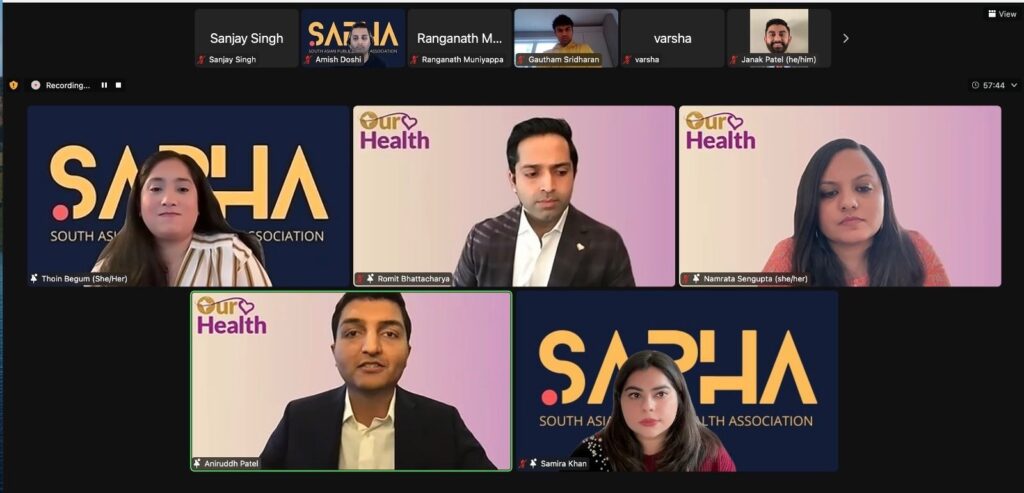South Asian heart health concerns in focus at SAPHA townhall
Atlanta, GA, March 30, 2024: “South Asians have higher rates of cardiometabolic diseases, including heart attacks, strokes, and diabetes, than other race groups,” said Dr. Romit Bhattacharya, a preventive cardiologist and physician investigator at Massachusetts General Hospital.
Dr. Bhattacharya was speaking at ‘Dil Se: A Virtual Town Hall on South Asian Cardiovascular Health’ organized by the South Asian Public Health Association (SAPHA) on Thursday, March 14. The event discussed cardiovascular health within the South Asian community and the importance of research initiatives such as the OurHealth Study, which aims to understand genetic and lifestyle risk factors for cardiovascular disease among South Asians living in the U.S. Many studies have described a higher rate of diabetes and cardiovascular disease among South Asians.
“What is unique about our population is that we see high rates of metabolic disease even among normal weight individuals,” added Dr. Bhattacharya, who is also the Medical Director of the OurHealth Study. “In fact, the American Heart Association considers South Asian ancestry to be a ‘risk-enhancing’ factor for cardiovascular disease. As nearly one in four individuals in the world is of South Asian descent, this is not simply an issue of South Asian health; it is a global health issue.”
Clinical risk factors, such as increased cholesterol, increased blood pressure, diabetes, and smoking, are well recognized to influence cardiovascular disease risk. Additional ‘risk-enhancing’ factors are more recently recognized conditions or traits linked to excess risk beyond conventional clinical risk factors.
“We can use genetics to help diagnose or predict our risk for cardiovascular disease,” said Dr. Aniruddh Patel, who is a co-investigator of the OurHealth Study and a cardiologist at Massachusetts General Hospital. Dr. Patel said that a challenge in using genomic data to predict the risk among South Asians is the underrepresentation of this population in genetic studies, though South Asians make up a quarter of the world population. “We lack data on South Asians, especially those living in the United States. As a result, we are stuck with using DNA data from other ancestries, which work to some degree but can still introduce inaccuracies in terms of predicting risk in our group. This raises the question of how we can improve upon this. The short answer is we need larger and more inclusive datasets with South Asians, including both clinical and genetic data.”
“OurHealth is a nonprofit research initiative, founded by cardiologists and geneticists based out of Broad Institute of MIT and Harvard, Massachusetts General Hospital, and Harvard Medical School and now has collaborators at Stanford and Yale,” said Namrata Sengupta, PhD, Public Outreach Advisor of OurHealth Study and Associate Director of Science Engagement, Policy, and Advocacy at the Broad Institute of MIT and Harvard. “The study aims to discover underlying genetic factors associated with cardiovascular disease risk in South Asians. Anyone who is living in the United States, older than 18 years, comfortable filling out surveys in English, and of South Asian ancestry, can participate in the OurHealth study. Participants will drive this research forward. They are going to do that by filling out surveys about their lifestyle habits and clinical information, sharing their electronic health records, and also providing saliva samples.”

The Town Hall, which was moderated by Thoin Begum, PhD, environmental sciences researcher and member of the SAPHA Board of Directors, had 90 attendees.
“Our collaboration with the OurHealth Study marks a pivotal moment in our commitment this year to advancing cardiovascular health within the South Asian community,” said Samira Khan, MPH, President of the South Asian Public Health Association and Assistant Director of Research & Clinical Initiatives in the Division of Pulmonary, Critical Care and Sleep Medicine at Mount Sinai.
The OurHealth study is currently enrolling participants. Learn more about the process through their website at OurHealthStudy.org.
Established in 1999, SAPHA is the premier organization dedicated to addressing public health issues impacting South Asians in the United States. It is SAPHA’s mission to promote the health and well-being of South Asian communities in the United States through advocacy, collaboration, and communication. for more information, check out the organization’s website at www.sapha.org
Cover photo courtesy: IANS





